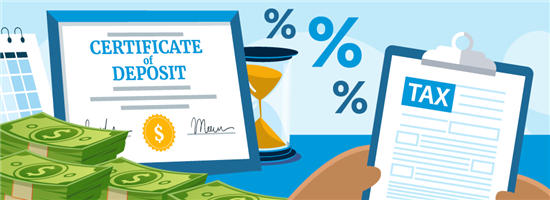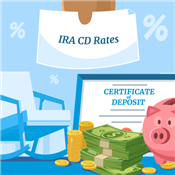Taxes on a CD
Are CDs taxable? The short answer is yes. Read on to learn more about how your CD is taxed.
 |
A certificate of deposit (CD) is a deposit account where you lock in money for a fixed term. In exchange, you also get a fixed rate that's usually higher than any regular savings account.
CDs are known to be low-risk investments. But did you know that your CD earnings are taxable interest income?
Taxes aren't often talked about when it comes to CDs. If you own a CD or plan to get one, here's how tax on a CD works.
How are CDs taxed?
According to the IRS, the interest you earn on a CD is taxable interest income.[1]
If you earned over $10 on your CD for the year, your bank will send you a Form 1099-INT to report as part of your federal tax returns.
Think of the CD interest you earned just like your salary or wage. Both are taxed as ordinary income that you must report at the end of the year.
Whether you cash out your CD interest or not, as long as the interest was earned within the year, it will be subject to tax that same year. The only exception would be if your interest income is earned on a tax-advantaged account like an IRA CD.
Do you pay state taxes on a CD?
Yes, depending on your state, your CD interest earnings might be subject to state taxes too. State income tax rates can go up to 13.3% depending on where you live or earned income.[2][3]
But the good news is you might not have to pay state income taxes on your CD if you're in the following states:
- Alaska
- Florida
- Nevada
- South Dakota
- Tennessee
- Texas
- Wyoming
The following states have either a flat income tax structure or a graduated-rate income tax structure: AL, AZ, AR, CA, CO, CT, DE, GA, HI, ID, IL, IN, IA, KS, KY, LA, ME, MD, MA, MI, MN, MS, MO, MT, NE, NH, NJ, NM, NY, NC, ND, OH, OK, OR, PA, RI, SC, UT, VT, VA, DC, WV, and WI.
How much tax do you pay on a CD?
How much tax you pay on your interest earnings depends on your federal income tax rate. This rate ranges from 10% to 37%, depending on your tax bracket. [4]
For example, if you're in the 24% tax bracket and earned $100 interest on your CD this year, you pay $24 in federal taxes.
If your income is subject to state income taxes, you'll pay more on top of the federal tax.
If you don't know how much you'll earn on your CD, here's a simple CD calculator you can easily use.
When do you pay taxes on a CD?
If you earned interest income of at least $10 or more in one year, then it will be taxable in that same year.
The term of your CD will not affect the interest income you're required to declare during a tax year:
- CD terms more than one year: interest earned in a year during the CD's term will be subject to tax.
- CD terms one year or less: interest earned in the year will be subject to tax.
Simply put, whatever interest income you earn in a year must be reported. The applicable taxes must also be paid for that year.
What you do with your CD and interest income during a year also does not affect when you pay your taxes. Whether you withdraw or reinvest your CD, if you earned interest that year, you will still pay the taxes that same year.
How to report CD interest earnings?
Your bank or financial institution should send you a copy of a Form 1099-INT if your CD earned at least $10 in a year. US tax season starts towards the end of January, so expect the form to be sent out in the same month.[5]
If you didn't receive a copy of the 1099-INT, you will still need to report your interest income to the IRS.
Do early withdrawal penalties affect taxes on CDs?
Generally, yes. Early withdrawal penalties can be deductible and reduce the tax on your CD. Box 2 on your 1099-INT will let you declare this for deduction.[6]
Say you pull out your CD before it matures and incur a $75 penalty. If you earned $100 in interest before withdrawing, you'll only pay taxes on the remaining $25 interest earned after penalties.
But while early withdrawal penalties can significantly reduce the taxes you owe, they can eat up the interest you earned. Keep that in mind when you're thinking of closing your CD early.
How to avoid paying taxes on CD
Unfortunately, you will end up paying taxes on your CD one way or another. But, you can delay paying taxes if you open a CD as a tax-advantaged account.
An IRA CD combines an individual retirement account (IRA) and a CD. If you open a traditional IRA CD, you can postpone paying taxes on your CD after you reach retirement age.
Alternatively, if you don't want to pay taxes at retirement going for a Roth IRA CD is an option. Your earnings will grow tax-free because you open the CD with after-tax dollars.
How do taxes on CDs compare to other investments?
CDs aren't a good choice if you want to avoid paying taxes on interest income. The IRS considers interest earned on bank accounts—including CDs—as taxable interest. There's no way around it for CDs.
Similarly, interest earned on other deposit accounts is also taxable. Other investments may be subject to taxes too. It all depends on whether the IRS considers the income you earn as taxable income. Here are some examples:
- Stock dividend income
Dividend income from stocks is taxable, but qualified dividends may qualify for lower capital gains tax rates. - Interest income on bonds
Interest income from some bonds, like corporate bonds, is taxable as ordinary income. - Rental income
Income from rental properties is taxable as ordinary income.
But, the IRS does outline some non-taxable interests that can be good investment alternatives. For example, earnings on some municipal bonds are tax-exempt at a federal and state level. Some government bonds might also be exempt from state taxes.[7][8]
Bottom Line
Taxes might not be front of mind when you open a CD. But they can eat into your earnings, so considering their impact beforehand is worth a thought.
For more control on when you pay your taxes on a CD, try exploring IRA CDs.
References
- ^ IRS. Topic no. 403, Interest received, Retrieved 04/06/2023
- ^ USAGov. How to pay and get help with state and local taxes, Retrieved 04/06/2024
- ^ Tax Foundation. State Individual Income Tax Rates and Brackets, 2024, Retrieved 04/06/2024
- ^ IRS. Federal income tax rates and brackets, Retrieved 04/06/2023
- ^ IRS. 2024 tax filing season set for January 29, Retrieved 04/06/2023
- ^ IRS. About Form 1099-INT, Interest Income, Retrieved 04/06/2023
- ^ IRS. Section 103 - Interest on State and Local Bonds, Political Subdivision, Retrieved 04/06/2023
- ^ IRS. Examples of nontaxable or excludable interest, Retrieved 04/06/2023
Write to Rue Atanacio at feedback@creditdonkey.com. Follow us on Twitter and Facebook for our latest posts.
|
|
|




